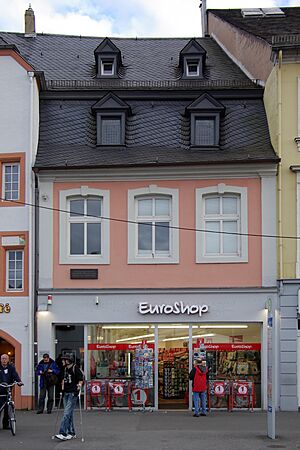Heinrich Marx facts for kids
Quick facts for kids
Heinrich Marx
|
|
|---|---|
| Born |
Hirschel Joshua Heschel ben Mordechai HaLevi
15 April 1777 |
| Died | 10 May 1838 (aged 61) |
| Nationality | German |
| Occupation | Lawyer |
| Known for | Father of the socialist philosopher Karl Marx |
| Spouse(s) | Henriette Pressburg |
| Children | 8, including Karl Marx and Louise Juta |
| Relatives | Laura Marx (granddaughter) Eleanor Marx (granddaughter) Jenny Longuet (granddaughter) Henry Juta (grandson) |
Heinrich Marx (born Herschel HaLevi; 15 April 1777 – 10 May 1838) was a German lawyer. He is best known as the father of Karl Marx, a very important thinker who developed ideas about how society and economies should work, known as socialism. Heinrich Marx had eight children, including Karl Marx and Louise Juta.
Contents
Early Life and Career
Heinrich Marx was born in Saarlouis, a town in France, in 1777. His birth name was Herschel Levi. He came from an Ashkenazi Jewish family. His father, Rabbi Marx Levi Mordechai ben Samuel HaLevi, was a religious leader in Trier, Germany. Heinrich's older brother, Samuel Marx, later took on this role.
Heinrich Marx became a lawyer in 1814. At this time, the area where he lived, called the Rhineland, was under French rule. However, after Napoleon was defeated in 1815, the Rhineland became part of Prussia. Prussia was a very conservative kingdom.
Facing Legal Challenges
A law from 1812, which the French had not strictly enforced, said that Jews could not work in legal jobs or for the government. When Prussia took over, they started to enforce this law. This caused problems for Heinrich Marx, who was a successful lawyer.
His friends and colleagues, including the head of the local court, tried to help him. They asked the Prussian Minister of Justice to make an exception for Heinrich. However, their requests were turned down.
Conversion to Christianity
To continue his work as a lawyer in Prussia, Heinrich Marx decided to convert to Lutheran Christianity. This happened in 1817 or 1818, and he changed his name to Heinrich Marx. His wife and children were also baptized into the Christian church a few years later, in 1824 and 1825.
Life After Conversion
Even though he converted, Heinrich Marx was not a deeply religious person. He was a man of the Age of Enlightenment. This was a time when people focused on reason and new ideas. He was very interested in the ideas of famous thinkers like Immanuel Kant and Voltaire.
Heinrich Marx believed in classical liberalism. This idea supports individual rights, limited government, and freedom. He actively worked for a constitution and other changes in Prussia. At that time, Prussia was ruled by an absolute monarchy, meaning the king had all the power.
In 1819, Heinrich Marx moved his family to a large house in Trier, near the ancient Roman archway called Porta Nigra. His wife, Henriette Pressburg, came from a wealthy Jewish business family in the Netherlands. Henriette's sister, Sophie, married Lion Philips, a rich Dutch tobacco maker. This family connection became important later, as Karl Marx and his wife, Jenny von Westphalen, often borrowed money from Lion Philips when they lived in London. Lion and Sophie Philips were also the grandparents of Anton and Gerard Philips, who later started the famous Philips Electronics company.
Heinrich Marx became a strong supporter of Prussia and its monarchy. He raised his family with liberal Christian values. He passed away from tuberculosis at the age of 61 and was buried in the Protestant cemetery in Trier.
Relationship with Karl Marx
Heinrich Marx made sure his son, Karl, was educated at home until he was twelve. When Karl was seventeen, in 1835, he went to the University of Bonn. Karl wanted to study philosophy and literature, but his father wanted him to study law, which seemed more practical.
At Bonn, Karl joined a student drinking club and even became its president. Because Karl's grades were not very good, his father made him transfer to the Friedrich-Wilhelm University in Berlin. There, Karl's law studies became less important than his interest in philosophy and history.
Even after Karl moved to Berlin, his parents worried about his lifestyle. They thought he spent too much money. In November 1837, Heinrich Marx wrote a critical letter to Karl. He said that Karl's behavior was messy and that he spent too much time studying in a disorganized way. He also mentioned that Karl was not social and did not show enough respect for his father. Heinrich worried that Karl's way of life would not lead to happiness.
Despite these disagreements, Karl always loved his father very much. His daughter, Eleanor, wrote that Karl "never tired of talking about him." Karl always carried an old photograph of his father. When Karl Marx died, his friend Friedrich Engels placed this photograph in his coffin.
Images for kids



